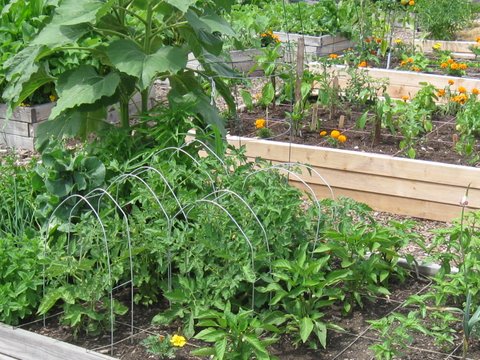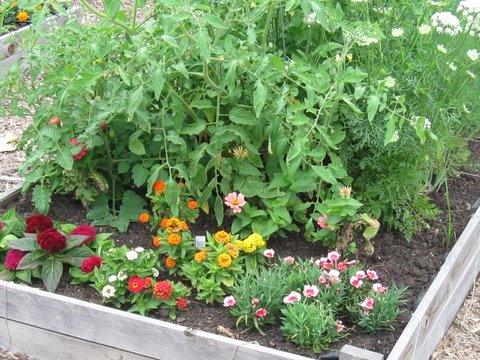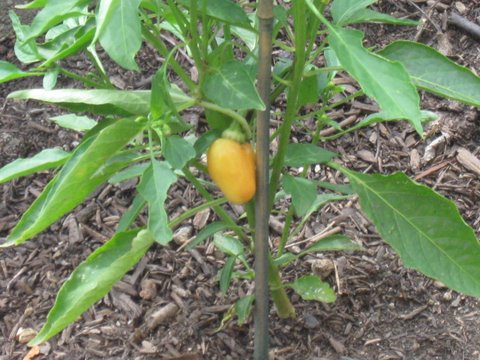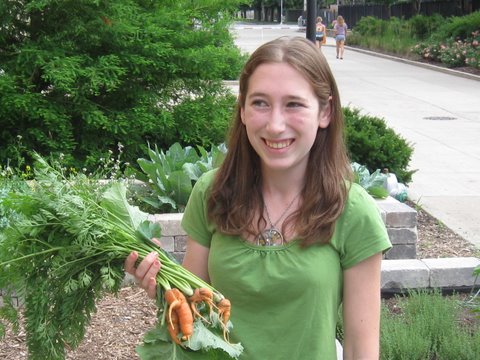The Birds (Chickens) and the Bees
 By Melanie Weiss
At the June 20 Oak Park Village Board Meeting, the board voted 6-1 to lift the village’s longstanding ban on beekeeping.
By Melanie Weiss
At the June 20 Oak Park Village Board Meeting, the board voted 6-1 to lift the village’s longstanding ban on beekeeping.
KC Poulos, Sustainability Manager for the Village, said village staff will now draft a beekeeping ordinance to present to the village board for their final approval. She expects the ordinance will come before the board in the fall.
The village does have an ordinance that allows the keeping of chickens, and recently there has been a resurgent interest among residents in housing chickens in their backyards.
Oak Park Farmers’ Market Manager Meredith Conn has a backyard chicken coop with two chickens, Esmeralda and Rhubarb. She said the chickens lay an egg every day and are “easy and fun to watch.” She did caution that they like to dig up her backyard plantings so she recently restricted them from roaming freely in the whole backyard.
Conn noted that two of her neighbors are also raising chickens and she knows another handful of Oak Parkers getting their eggs fresh from the chicken coops they have in their backyards!
One Oak Parker has even made this her business -- and business is booming! Jennifer Murtoff, of Home to Roost Urban Chicken Consulting, offers information and advice on raising chickens in an urban environment. She can be reached through her website: www.urbanchickenconsultant.wordpress.com
Related articles:
http://www.greencommunityconnections.org/movie-inspires-the-decision-to-raise-chickens/
http://www.greencommunityconnections.org/top-10-reasons-to-raise-chickens/
http://www.greencommunityconnections.org/colony-collapse-disorder-threatens-honey-bees/
It Takes a Village to Support a Community Garden!
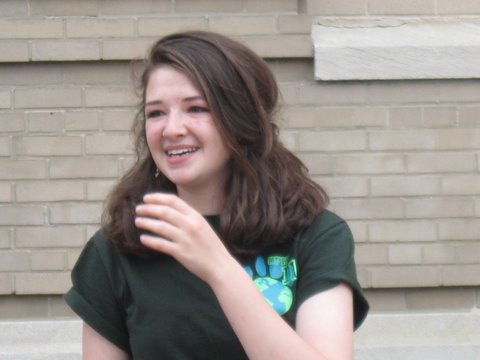 Remarks by Charlotte Goldman, OPRF High School class of 2011 - at the Grand Opening Of the OPRF "Herban Garden"
Remarks by Charlotte Goldman, OPRF High School class of 2011 - at the Grand Opening Of the OPRF "Herban Garden"
Hi my name is Charlotte Goldman and I am one of the many leaders of the Environmental Club. Thank you again everyone for coming to share this important day with us. We have been waiting for this day for almost a year now. From the moment we started work on this project, we have had the help, support, and aid from the community. As some of you know, we first had the idea to build a roof garden, but because of legal reasons, this idea was passed by and we too passed the idea off for other dreams. But by chance, Donna Schuler from the OPRF Garden Club heard of our aspirations to build a community garden. We then received wonderful news over the summer of the gracious gift presented to us by the Garden Club, and we were back in business. This simple gift got us back on our feet, and rejuvenated our passions towards building an urban garden.
I remember looking at the garden after our fist workday. We had transplanted all the bushes and plants that had previously been here around the school, and what we were left with was a blank canvas of dirt, on what now rests the ‘Herban’ Garden, and I thought… “Can we really finish this project, or did we bite off more than we can chew?’ It was fear wrenching. But with the help and support from everyone around us, we achieved our goal, as we all can see. This garden threw us into the open seas with no floatation devices, and together we would either sink or swim. So, with little knowledge, we moved forward.
We were graced by the help of McAdam Landscaping and Mr. Scott McAdam, who devoted time and effort to consulting us, aiding us in the layout, advice, and products to use. We would also like to thank Tammy Cheverny from McAdam Landscape who was essential to the finalization of the garden from supplying the dirt and aiding us with advice and undying support. Through McAdam landscape we were introduced to Unilock, and Mr. Auggie Rodriguez, our brick supplier, who was always willing to patiently answer our many emails and phone calls, and always available to consult during the stone laying process, and was, of course, able to set us up with the best deals possible. We would also love to thank Rober J Neylan Architect Lmt. for drawing up our layout, AA Rental for aiding in the brick laying process, JH Mohr Concrete for the wonderful gravel, and Jessica with Seguin Services, for growing our plants and holding them as long as we needed since the construction took longer than expected, and Buildings & Grounds, who were always there to help us with our incessant needs on those late Sunday nights. Throughout the whole process we have met some fabulous people that were not only there to support us and help us, but to offer assistance and motivation to get this garden in tip top shape and complete our goals and dreams. This truly has become a community garden.
And looking around I think that we have achieved exactly what we set out to do. So again, I would like to thank everyone; whether it was the undying support, the inspiration, the donations, the supplies, the advice, the brain power, or the manual labor, it truly was a community effort. We would also love to thank Ms. Wise and Ms. McGuckin, because without them we would be lost. The school for being so accommodating. The Environmental Club and the family members dragged along with them, thanks again for the free labor! And most of all, to the 5 other co-presidents, my family. Our little dream, it has finally bloomed, and I wouldn’t have wished to overcome this feat with any other group of friends. So please enjoy this garden, love it, care for it, spread the word, because it aint leaving as long as we are around!
Grand Opening of the OPRF High School’s "Herban" Garden
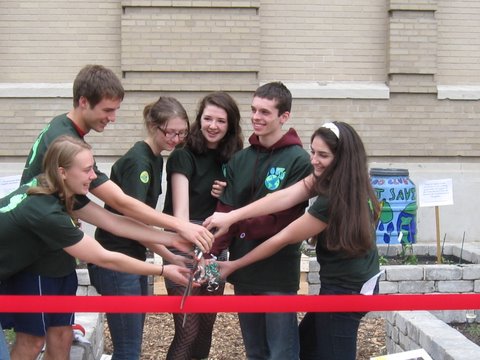 Remarks by Russell Trenary, OPRF High School class of 2011 - shared at the Grand Opening Ceremony:
Remarks by Russell Trenary, OPRF High School class of 2011 - shared at the Grand Opening Ceremony:
This garden despite its small area, has a great potential benefit for the school. First and foremost, this garden provides our cafeteria a readily available and free source of fresh, organic produce. While we must credit OPRF's food service in their efforts to purchase produce from nearby farms, this garden takes local food to whole new level. The industrialized food production system, from fertilization to transportation, is one of the most environmentally damaging industries. This garden is a step in the right direction -- away from such a system.
In the coming years we hope to see the current garden be just one section of an expanding urban food production system at OPRF and in the community. Moreover, the educational impacts of this garden should be fully recognized. The disassociating effects of the industrial food system can be greatly alleviated by the reminder that this garden  provides -- the reminder that food should come from soil, sun and not too much else. And while the garden may be small now, it is at the forefront of a rapidly expanding movement in this country principled in the reclaiming of food, whole and simple.
provides -- the reminder that food should come from soil, sun and not too much else. And while the garden may be small now, it is at the forefront of a rapidly expanding movement in this country principled in the reclaiming of food, whole and simple.
Finally, this garden is proof that cooperative efforts motivated by common interest are not only possible but have great potential for success. These stone walls will last many decades into the future and the movement will undoubtedly grow in that time. Have a good evening and come visit often as this garden is an evolving entity.
Composting Inside and Out: 14 Methods to Fit Your Lifestyle
 June 20th, at 7pm, Chicago author Stephanie Davies will present a program based on her book, Composting Inside and Out: 14 Methods to Fit Your Lifestyle at the Oak Park Public Library. The book includes in-depth instruction on the best composting methods for home, garden, and urban living. Plus special features on soil health, composting equipment, and stories from the worm world.
Since graduating from the University of Illinois in Chicago in 2008, Stephanie Davies has helped install hundreds of residential worm bins throughout the country. According to the Urban Worm Girl web site, they provide worm composting solutions for everything from household bins for a family, to classroom bins and education for students, and commercial bins for offices and cafeterias. More recently, she has been installing the first wave of commercial worm bins throughout the Chicago area to help manage commercial restaurant and office waste on a grand scale.
June 20th, at 7pm, Chicago author Stephanie Davies will present a program based on her book, Composting Inside and Out: 14 Methods to Fit Your Lifestyle at the Oak Park Public Library. The book includes in-depth instruction on the best composting methods for home, garden, and urban living. Plus special features on soil health, composting equipment, and stories from the worm world.
Since graduating from the University of Illinois in Chicago in 2008, Stephanie Davies has helped install hundreds of residential worm bins throughout the country. According to the Urban Worm Girl web site, they provide worm composting solutions for everything from household bins for a family, to classroom bins and education for students, and commercial bins for offices and cafeterias. More recently, she has been installing the first wave of commercial worm bins throughout the Chicago area to help manage commercial restaurant and office waste on a grand scale.
This program is co-sponsored by Ethical Eating, an Oak Park community organization. 7 pm Veterans Room, Second Floor, Main Library.
Charlie's Gardening Tips - Now that Spring is Really Here . . .
 By Charlie Ruedebusch, Head Gardener @ Cheney Mansion
If you haven’t had time to go out and prepare your gardens or planters for the year, don’t worry. The season is just starting!
By Charlie Ruedebusch, Head Gardener @ Cheney Mansion
If you haven’t had time to go out and prepare your gardens or planters for the year, don’t worry. The season is just starting!
If your garden soil is heavy and full of clay (and whose isn't around here?), get yourself lots of compost and mix mix mix it into the soil. Hard work now makes for much easier gardening and happier plants for years to come. Add some slow-release, granular fertilizer into the soil as you mix in the compost (follow the package directions for amounts).
If you have planters and haven’t replaced the potting mix for a few years, buy new mix this year. Old potting soil tends to break down over the years (it is organic, after all). Some potting mixes have fertilizer already in them – if not, add your own slow-release fertilizer according to directions. Don’t use any topsoil in containers – it’s much too dense.
The weather we had this year reminds us that it does still get cold in Chicagoland in May! While vegetables like peas, lettuce, radishes, and carrots, and flowers like pansies don’t mind cold weather and could be planted back in April, many other veggies and most annual flowers need warm weather to thrive. Tomatoes, peppers, and eggplants hate cold weather and cold soil, and are best planted after mid-May. Many expert gardeners don’t plant their tomatoes until Memorial Day!
If you’ve started your own seeds indoors this year (good for you!), or purchased seedlings from a greenhouse, it’s a good idea to “harden off” the seedlings before planting them in the garden. This just means setting them outside in the shade for a few days, and bringing them back into the house or porch at night. This gives the tender seedlings a little transition time to get used to the big wide world out there in the garden.
Late May is a great time to plant seeds of cucumbers, melons, squash, and beans directly into the garden. Cukes, melons, and squash plants will get big by the end of summer, so give them plenty of room in the garden.
You can snip off the spent flowers from spring bulbs, but not the foliage. The leaves are needed to make food stored in the bulbs for next year’s flowers. Lightly fertilizing the plants just after they flower (or earlier, just after they pop out of the ground) can’t hurt. While daffodils and hyacinths often come back year after year, tulips are fussier and tend to bloom only for a few years – it’s not you, it’s them.
You can make fall-blooming perennials such as mums, asters, or sedums bushier with lots more flowers by doing this simple trick. Pinch or shear a few inches off the plants twice in late spring: once in mid-May, and once in early June.
Now for the W word. Weeds are always with us. Keep on top of them when they’re small, and you’ll save yourself lots of work later in the season.
Enjoy the season!
Colony Collapse Disorder Threatens Honey Bees
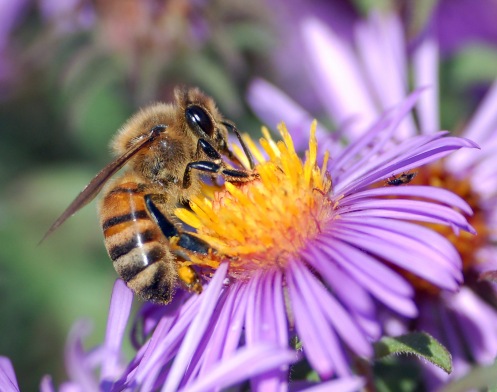 “ If honey bees become extinct, human society will follow in four years.” -- Albert Einstein
Much of our food depends on the pollination of the bees. “One out of three bites of food comes from the pollination of a honey bee,” so low numbers of bees mean fewer fruits and vegetables.
“ If honey bees become extinct, human society will follow in four years.” -- Albert Einstein
Much of our food depends on the pollination of the bees. “One out of three bites of food comes from the pollination of a honey bee,” so low numbers of bees mean fewer fruits and vegetables.
In recent years, beekeepers have been losing 25 percent of their hives each winter. Thirty years ago, the rate was 5 percent to 10 percent The cause or causes of the syndrome are not yet fully understood, although many authorities attribute the problem to biotic factors such as: mites and insect diseases Other proposed causes include environmental change-related stresses, malnutrition and pesticides, and migratory beekeeping. “It could be a combination of all those factors weakening the bees’ immune system,” said David Burns, an Eastern Apicultural Society of North America certified Master Beekeeper.
It is being called Colony Collapse Disorder (CCD) and is causing agricultural honeybees nationwide to abandon their hives, and disappear. This is raising worries about crops that need bees for pollination.
If the Disorder continues, it is estimated that honey bees would disappear by 2025. In a recent Chicago Tonight piece viewers were told that they can help the bees by growing plants the bees depend on, particularly herbs like oregano and thyme; http://blogs.wttw.com/moreonthestory/2011/04/27/beekeeping-in-illinois/ .
The Farmers' Market is Back . . . Finally!!
 The Oak Park FARMERS' MARKET starts it's 2011 season on Saturday, May 21st, 7am - 1pm, in the Pilgrim Church parking lot, 460 Lake Street, one block west of Ridgeland and Lake. For more information visit www.oak-park.us/farmersmarket.
The Oak Park FARMERS' MARKET starts it's 2011 season on Saturday, May 21st, 7am - 1pm, in the Pilgrim Church parking lot, 460 Lake Street, one block west of Ridgeland and Lake. For more information visit www.oak-park.us/farmersmarket.
The Oak Park Farmers' Market offers high quality, locally grown produce which you can buying from the farmers who raise the food nearby.
The Market is open the second to last Saturday of May through October.
The Market is much more than a farmers' market. It is a concert site featuring the OP Farmers' Market bluegrass band, a social event and a great place to pick up traditional and unusual plants, fresh cheeses, honey, flowers, vinegars, herbs, and much more.
Thoughtful Living Series Continues at River Forest Library with "Your Grandma was a Locavore"
 Eating locally and with the Seasons
Eating locally and with the Seasons
The River Forest Parks Foundation and the River Forest Public Library are pleased to present a series of monthly community programs in 2011 centered around the theme of “Thoughtful Living”. The next topic in the Thoughtful Living Series include Your Grandma Was a Locavore- Thursday, May 12 at 7 p.m.
What does it mean to “eat local”? Like the idea of eating seasonal produce grown on regional farms but wonder what’s in season near you this week? And just how are you supposed to eat local in the winter in Chicago? Join us for a discussion with members of Growing Power, the urban agriculture organization featured in the documentary Fresh.
Growing Power teaches individuals and communities sustainable practices to grow, process, market, and distribute food. Learn how eating “green” can mean eating fresher, healthier foods while reducing your grocery bill and supporting local farmers.
We hope you will drop in for this special series of events! River Forest Library, 735 Lathrop Avenue, River Forest. Programs are free and our website is www.riverforestlibrary.org, phone is 708-366-5205.
Oak Park Conservatory Offers Green Thumb Workshops
 Each spring, The Oak Park Conservatory at 615 Garfield Street, offers helpful workshops for all sorts of gardeners, from home owners to deck planters in condos and apartment building. This year you can attend one of the following:
Each spring, The Oak Park Conservatory at 615 Garfield Street, offers helpful workshops for all sorts of gardeners, from home owners to deck planters in condos and apartment building. This year you can attend one of the following:


